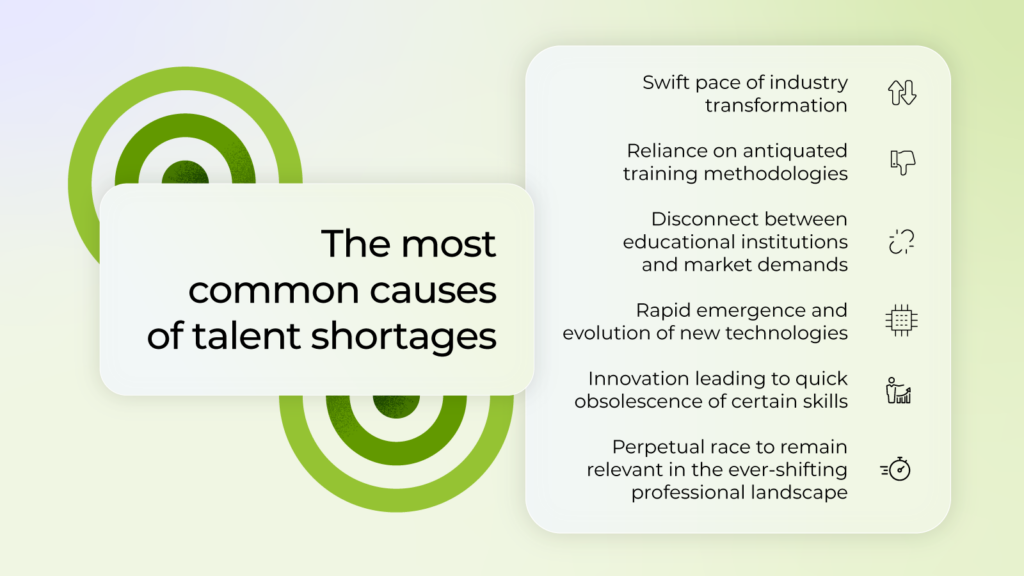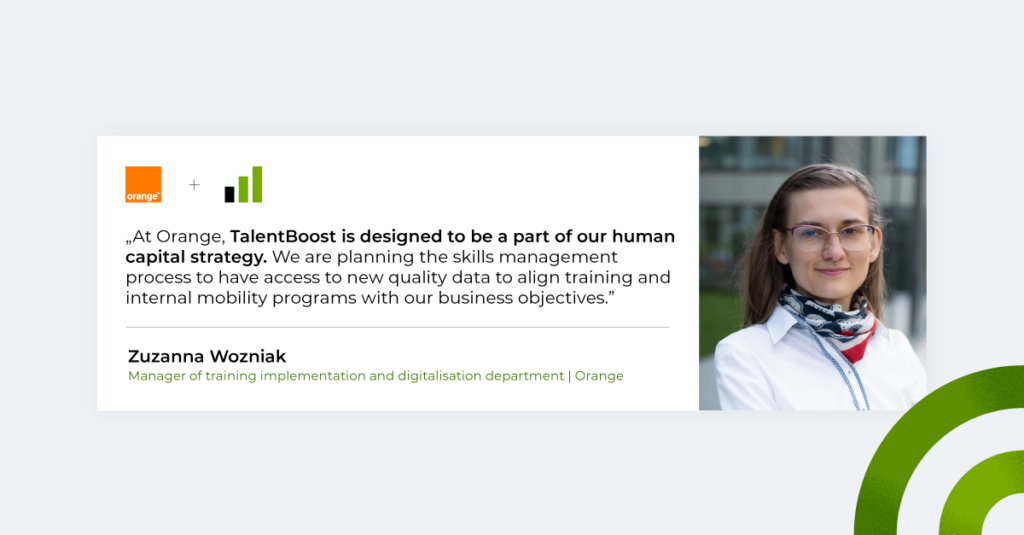
Wie Plattformen für das Kompetenzmanagement moderne Unternehmen prägen

In the past, businesses anchored their talent assessment and development strategies in conventional HR methodologies.
These tried-and-true practices, while effective for their time, have been eclipsed by the accelerating pace of technological evolution and the sweeping transformations brought about by the digital age. Today, skills management software stands at the forefront of this change, evolving into indispensable assets for contemporary enterprises.
These platforms not only offer a more granular view of employee competencies but also provide dynamic pathways for nurturing and aligning talent to meet the ever-changing demands of modern business landscapes.
Understanding talent gaps
Causes of talent gaps
Organizations often grapple with talent gaps, which can be attributed to a myriad of factors. One significant contributor is the swift pace of industry transformation, which constantly reshapes the skill set required for success.
Coupled with this is the reliance on antiquated training methodologies that may no longer resonate with or effectively upskill the modern workforce.

Additionally, there exists a frequent disconnect between educational institutions and the real-world demands of the market, resulting in graduates who may not be fully equipped for contemporary roles.
Compounding these challenges is the rapid emergence and evolution of new technologies. This relentless march of innovation often means that certain skills can become outdated almost as quickly as they are acquired, creating a perpetual race to remain relevant in an ever-shifting professional landscape.
Impact on businesses
Talent gaps, when left unaddressed, can pose significant threats to an organization’s trajectory and market standing.
Firstly, a deficiency in the necessary skills can directly impact productivity, with tasks taking longer to complete or not meeting the desired standards, leading to inefficiencies.
Furthermore, these gaps often translate into escalating operational costs; businesses might find themselves investing more in training, external consultants, or even in rectifying mistakes that arise from skill deficiencies.
Most critically, talent gaps can blindside an organization to emerging opportunities in the market. Without the requisite expertise on board, companies may lag in innovation, miss out on potential ventures, or fail to capitalize on new trends, thereby ceding ground to more agile competitors.
In essence, talent gaps are not just internal challenges but pivotal factors that can shape an organization’s external market dynamics.
What Makes Skills Management Software Indispensable?
In today’s rapidly evolving job market, organizations face a constant challenge in keeping pace with emerging technologies and changing skill requirements. This is where skills management software comes in as a game-changer for businesses of all sizes. By providing a centralized platform to assess, track, and develop employee skills, this software empowers organizations to navigate the complexities of talent management strategically. Let’s delve into the core aspects that make this software truly indispensable.
Automating Competency Assessment
Evaluating employee competencies accurately is fundamental to any successful skills management strategy. However, traditional methods, often manual and time-consuming, can be prone to biases and inaccuracies. Skills management software offers a transformative solution by automating competency assessments.
This means businesses can design standardized tests and questionnaires that align with specific job roles and industry benchmarks. The software then automates the process of administering, evaluating, and recording these assessments, saving significant time and effort for HR departments and managers.
Bridging skill gaps in real-time
One of the most significant advantages of skills management software is its ability to identify skill gaps in real-time. By continuously monitoring the skills possessed by the workforce and comparing them against evolving job requirements, the software provides organizations with a clear picture of existing competency gaps.
This real-time insight is invaluable for making informed decisions regarding talent development initiatives. Businesses can use this data to create targeted training programs that address specific skill deficiencies, ensuring that employees develop the competencies needed to excel in their roles and adapt to future demands.
Cultivating a culture of continuous learning and improvement
Skills management software is more than just an assessment and tracking tool; it’s a catalyst for fostering a culture of continuous learning and improvement within organizations. By providing employees with personalized learning recommendations based on their identified skill gaps, the software empowers individuals to take ownership of their professional development.
Furthermore, the platform can integrate with various learning resources, such as online courses, training platforms, and mentorship programs, offering employees diverse avenues for upskilling and reskilling. This accessibility to continuous learning opportunities motivates employees to stay ahead of the curve and adapt to the ever-changing needs of their roles, ultimately contributing to increased engagement, productivity, and job satisfaction.
Analyzing top skills management platforms: A comparative overview
Welcome back, readers! Today’s topic is something I get asked about a lot – navigating the world of skills management platforms. Choosing the right software for your team can feel like a daunting task, but trust me, it doesn’t have to be. Let’s dive in!
Features and functionality to look for
Before we get into specific platforms, it’s important to understand what to look for. A robust skills management platform should offer a range of features to streamline your HR processes and empower your workforce. Here’s a breakdown of essential aspects to consider:
Skills matrix and employee dashboard
A good starting point is the platform’s ability to create a clear and visual skills matrix. This tool gives you a comprehensive overview of your team’s existing skills, highlighting any potential gaps or areas for improvement. Coupled with this, an intuitive employee dashboard is crucial, empowering employees to track their own skills, set personal development goals, and access relevant learning resources.
Comprehensive skills assessments
Next, consider how the platform handles skills assessments. Effective platforms often include various assessment methods, from self-assessments to 360-degree feedback, to provide a well-rounded view of an individual’s capabilities. This information helps identify training needs and tailor development plans accordingly.
Learning and development integrations
Speaking of development, the platform’s integration with learning and development tools is crucial for fostering a culture of continuous learning within your organization. Look for features that enable you to recommend relevant courses, track learning progress, and seamlessly integrate training programs into the platform.
Mobile accessibility and user experience
In today’s fast-paced world, mobile accessibility is non-negotiable. Make sure the platform you choose offers a user-friendly mobile experience, allowing both employees and HR professionals to access information and manage tasks on the go.
Advanced analytics for performance tracking
Finally, don’t underestimate the power of data. A good skills management platform should provide advanced analytics and reporting functionalities. This data-driven approach allows you to measure the effectiveness of your skills development initiatives, track employee progress, and identify areas for further optimization.
The role of skills management in talent development strategies
Navigating the complexities of today’s business landscape requires organizations to prioritize talent development. A strategic approach to Kompetenzmanagement is crucial in building a future-ready workforce. But how do you actually cultivate talent within your organization? It comes down to understanding and nurturing the skills your employees possess and identifying those needed to excel.
Reskilling, upskilling, and cross-skilling workforces to meet future demands
The rapid pace of technological advancements and evolving industry needs can create skill gaps within organizations. To address these gaps and ensure their workforce remains competitive, companies are increasingly investing in reskilling, upskillingund cross-skilling initiatives:
- Reskilling involves equipping employees with new skills to transition into different roles. This is particularly relevant when job roles become obsolete due to automation or market shifts.
- Upskilling focuses on enhancing employees’ existing skills and knowledge to improve their performance in their current roles. This might involve training on new software or technologies.
- Cross-skilling involves training employees in skills relevant to different departments or functions. This fosters collaboration and allows teams to adapt to changing project demands.
By investing in these areas, organizations can foster a culture of continuous learning, boost employee morale, and ensure they have the talent to adapt and thrive in a dynamic environment.
Personalized development plans: Aligning aspirations with organizational goals
Effective talent development extends beyond generic training programs. Personalisierte Entwicklungspläne play a key role in nurturing employee growth and aligning individual aspirations with organizational goals. These plans provide employees with a clear roadmap for their career progression. How can this be achieved? It starts with identifying individual strengths and areas for improvement. Through personalized development plans, employees gain access to targeted training, mentorship opportunities, and challenging projects that allow them to develop their skills and reach their full potential. This targeted approach not only benefits the individual but also enables organizations to build a highly skilled and engaged workforce that is equipped to drive future success.

Real-life success stories
Orange elevates employee potential and business growth with DevSkiller
Overview
Recognizing the shifting paradigms of the digital age, Orange, a renowned brand in the telecommunications sector, acknowledged the imperative of preparing its workforce for forthcoming challenges and opportunities. Aligned with this vision of fostering a future-ready team, Orange formed a strategic alliance with DevSkiller. Together, they initiated a groundbreaking skills management endeavor, aiming to seamlessly blend the workforce’s capabilities with the company’s progressive digital roadmap.
Key Objectives
- Equip employees with cutting-edge skills to unlock their full potential.
- Enhance job satisfaction, ensuring higher retention rates.
- Harmonize individual employee development trajectories with overarching company goals.
The DevSkiller impact
With DevSkiller’s robust platform, Orange successfully initiated “TalentBoost,” a program envisioned to be an integral pillar of their human capital strategy. This initiative aimed to provide employees with a comprehensive skill assessment and enhancement roadmap, tailored to both the individual growth of employees and the broader business objectives of the company.

Quote from Orange leadership
Outcome
Harnessing the robust features of DevSkiller, Orange embarked on a transformative journey that transcended traditional workforce development.
Instead of merely training its employees, the company bestowed upon them a forward-thinking skill set, prepping them for the challenges and innovations of tomorrow. This proactive approach had a ripple effect.
It didn’t just elevate the proficiency levels but also instilled a deeper sense of commitment and enthusiasm among the employees. The results were palpable — a workforce that was not only more competent but also deeply engaged, aligned with the company’s vision, and imbued with a renewed sense of satisfaction in their roles.
This synergy between Orange and DevSkiller showcases the profound possibilities that arise when companies prioritize strategic skills management. It serves as a clear illustration that the right investment in skills doesn’t just bolster individual capacities but also fortifies the broader scaffolding of organizational success.
Read more about Orange customer story here
Schlussfolgerung
In today’s dynamic business environment, where change is the only constant, the proficiency to quickly discern and address talent disparities is of utmost importance.
Skills management platforms, equipped with state-of-the-art functionalities and an analytics-centric methodology, present an invaluable answer to this challenge.
Beyond their utility as mere technological solutions, these platforms stand as integral strategic pillars, capable of steering the trajectory of success for contemporary enterprises, ensuring they remain at the forefront of their industries.
Discover how DevSkiller skills management platform can help you.
Termin für eine Demo mit einem unserer Produktexperten oder sehen Sie sich diese kurze 5-minütiges Demo-Video um mehr darüber zu erfahren.
FAQs
- What are skills management platforms?
They are digital platforms designed to identify, assess, and develop the skills within an organization. - How do they help in bridging talent gaps?
They provide real-time insights into existing skill sets, identify gaps, and offer tailored training solutions. - Are these platforms suitable for small businesses?
Yes, many platforms are scalable and cater to businesses of all sizes. - How often should the skills database be updated?
Regularly. As industries evolve, it’s essential to keep the skills database current to stay competitive. - What’s the ROI on investing in a skills management platform?
While the exact ROI can vary, businesses generally witness improved efficiency, reduced training costs, and higher employee retention rates.




